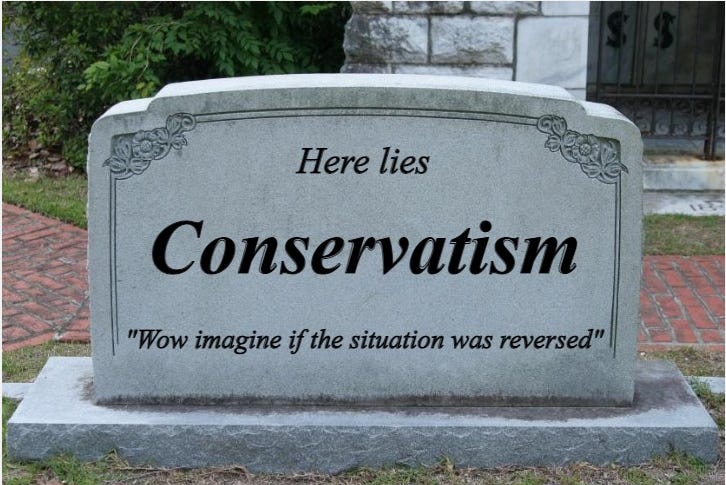Political Movements Need Enemies
... and populism needs them more than most - so be careful who you cancel
As a reminder, here's what Jimmy Kimmel said that initially got him suspended from hosting his chat show:
We hit some new lows over the weekend with the MAGA gang desperately trying to characterize this kid who murdered Charlie Kirk as anything other than one of them and doing everything they can to score political points from it.
In the days since, the conversation has focused on the free speech considerations, whether the comments were supposed to be a statement or a joke, and what Kimmel should have known about the shooter's motivations at the time he said this.
An under-examined aspect of the whole episode is whether this new found ability of Populists to force media organisations within the mainstream to kow-tow to them, and to remove or sideline people they don't like, is actually good for populism. I think it’s arguable that it’s a mixed blessing. As with the left, the right has a symbiotic relationship with the legacy media but it’s different in some interesting ways.
For populism, a partisan activist media is the non-fungible resource that has created and sustains the backlash to progressive liberalism. An overbearing media confirms that populism's claims about the biased nature of legacy institutions are true. For the right ot's important to be able to complain about these institutions, but from a purely tactical perspective, defeating them or *getting rid of them* (or cowing the personalities that operate in them into total silence) would be a total disaster.
Modern populism generally and Trumpism specifically are an anti-media phenomenon. Upending every element of the western order because we don't like what we see on TV seems and is frivolous, but it's also more than that. For people who are disengaged from politics, but who feel that ideologically-driven political decisions are negatively affecting them, it can be hard to put their finger on where the intrusion into their lives originates.
Take key flashpoints like immigration or trans activism; populist voters feel the world changing around them - but can't grasp at the decision points that are driving this change, which seem to arrive in front of them having already been made many years ago, in places beyond their reach by people with whom they seemingly have no influence. Any objections they might have to the changes are de-legitimised as extremism and misinformation before they’ve even been made. A government-subsidised activist apparatus doesn't exist to galvanise normies into action and channel their discomfort on these topic into political outcomes as it does for progressive causes.
The sense of distance from system decision-making, the invisibility of decisions until they’re already well-advanced - all this means that art, entertainment and mainstream popular culture become more important. These are the places where progressivism’s worst tendencies become visible. It is where the attitudes that drive the changes you hate are crystallised into hateable personalities and soundbites that summarise the enemy position. The functioning of the system might be opaque and inaccessible but the legacy media is the place that finally gives you a name and a face you can point to, and a target you can hit, from your living room.
This is compounded by the fact that progressives don't help themselves. The overwhelming cultural dominance of Progressive attitudes within mainstream means that they can't help but politicise neutral media spaces, rub their dominance in the faces of their opponents and casually crush dissent without even realising they've exerted their power. In the past I have described this as a kind of narrative privilege; within mainstream legacy institutions there is an assumption on the part of certain types of high-status people that it is only natural that they should be able to advocate for their value preferences with a frankness that is forbidden to other groups.
The risk is that his outlook can become so dominant that it turns you into a sort of blind giant, powerful but clumsy and oblivious. It has also exacerbated the theory of mind problem that we hear about so much - progressive voices are so dominant and entitled that they seem to forget that they are in public, and can be heard by lots of people who disagree with them who have voices of their own.
In that sense it's not a surprise that Kimmel was a breakpoint. Mainstream TV Comedy, for whatever reason, has long been an epicentre of this phenomenon. It is shocking to step back and consider that during the Trump era, the blind giant convinced itself it could turn this whole side of the public square into overt and strident political messaging for one side, even though it cost you a fortune and lost you viewers, and that there would never be any blowback at all.
For me the nadir of this came early on, with Saturday Night Live singing North Korean-style hymns to the defeated Hillary Clinton without even bothering to disguise it as comedy. But on an ongoing basis the core of the phenomenon was similar content being churned out by late night talk shows like Colbert, Seth Myers, and Kimmel, acting as recruiting sergeants for Trumpism in the process. These are American shows and voices but impact of this isn’t limited to America - neither issues nor content knows boundaries, and along with their local equiablents the clips that these shows generated helped have a radicalising effect in the wider world.
An obvious response to the point of "populism should preserve bad mainstream comedy because it's a vote winner" is "populism can simply build mainstream cultural institutions of its own" but the prospects there are not good. Either by natural disposition or as a result of cultural forces, the people who make up the populist right voter base are not good at thinking institutionally or long-term. For one, many were specifically repelled from progressivism and towards an alternative specifically because they don't enjoy being morally imposed on and don’t wish to morally impose on others. They don't have the neurotic personality strain that compels them to try and micro-manage the emotional lives of their opponents so they can sleep at night, which is so characteristic of progressive people.
Even if they were inclined to build, the harsh truth is the university education and professional backgrounds that foster institution-building abilities are as of right now still disproportionately on the progressive side, as is the experience of being in and running elite cultural institutions. Despite the success of the vibe shift, the culture-producing and -legitimising institutions like universities and legacy media organisations still basically belong to the enemy. There is no right wing alternative to replace them and no sign that one is about to suddenly emerge.
If it's not good at building, the populist right can certainly corrupt and degrade cultural institutions that the left once owned, often without understanding what made them work. The archetypal example here is Twitter, pre-and post Musk, which has become a kind of blind giant of its own. The cultural vanguard of the right flourished on twitter because that was where the left-wing elite gathered - they suddenly found themselves in contact with articulate people who disagreed with them, with the latter unable to escape, and robbed of the ability to respond effectively by years of privilege. That was a tremendous source of power for the right, and caused the system to respond with suppressive tactics, some of which Musk thankfully reversed. But the point is the fight is what made the platform powerful.
In the last couple of years the impotence of mainstream conservatism was often summarised by the ironic use of the phrase "imagine the roles were reversed". The implication was that they settled for imagining the roles were reversed because the reality of upending the status quo was so impossible. In 2025 it seems the cultural roles finally have been reversed; if the firings in the wake of Charlie Kirk’s death are anything to go by, the right has the cultural whip-hand over the left for once. But a crude role-reversal is a mixed blessing because right- and left-leaning people exist in different environments, and have different impulses driving them into politics; so they have different relationships with the values expressed by and through the media.
There is a certain amount of joy in being able to say "turnabout is fair play", and pointing out that threats to turn cancellations on the right once the left is back in cultural power are empty because they already did that - that's how we got here. The fact remains is that a lot of left-leaning media content is in fact politically more useful to the right than the left. Kimmel's show is a small example of the very attitudes that created mainstream populism - and killing it isn't going to result in something equally valuable rising in its place.



He's back on but two big affiliates will not carry his show pending further enquiry.
Broadcast TV is dying, with only oldies (ahem) watching. Younger people do not "get" the idea of appointment TV. They stream what they want, when they want. Amazing how Carson, Letterman, Craig Ferguson all managed not to be didactic finger wagging schoolmarms.
Exactly right. I've been very frustrated at the desire to stomp on Kimmel's show from the right, even if he deserves it, when the best thing is just to let him disperse in the breeze. Sadly seems impossible to stop. I think the time of fish in a barrel is coming to a close, for better or worse.
But though It's ugly, and tactically dumb, it may be ultimately for the best that the fight is being botched. It's false to be arguing about late night cable shows like they're what the culture pivots on anymore. Gonna have to find a new way somehow.